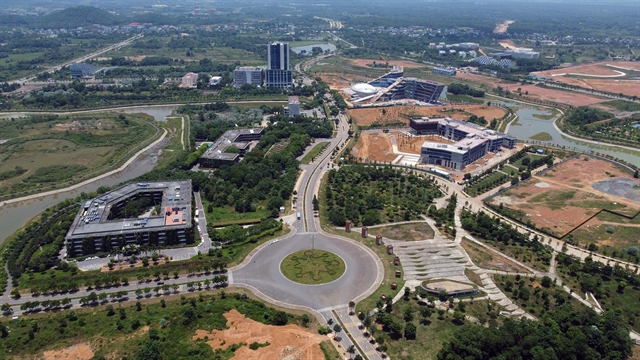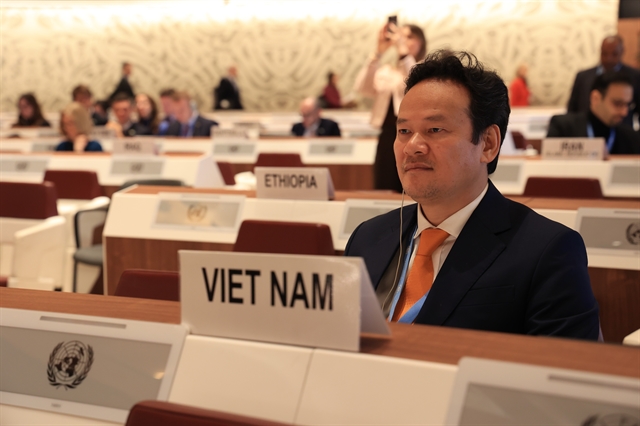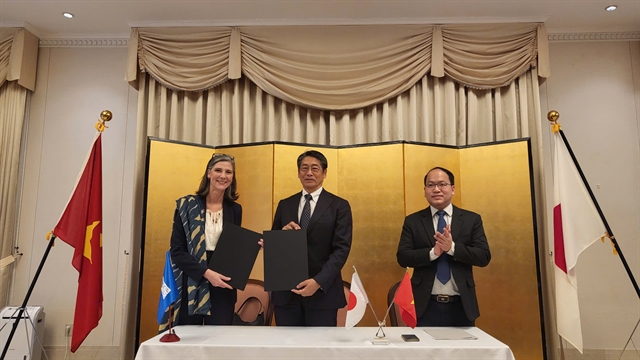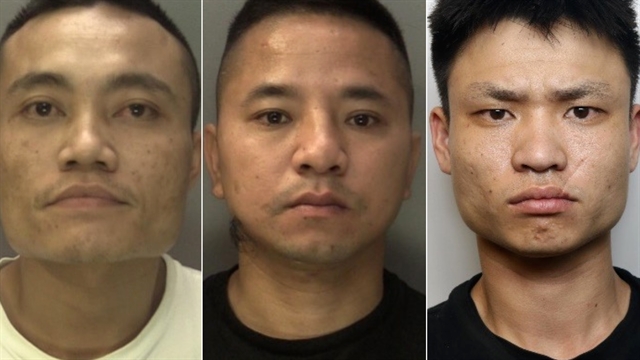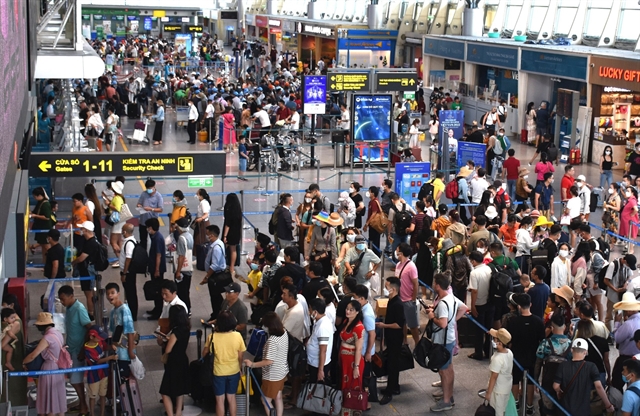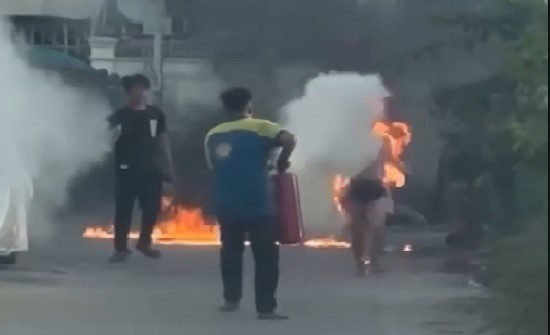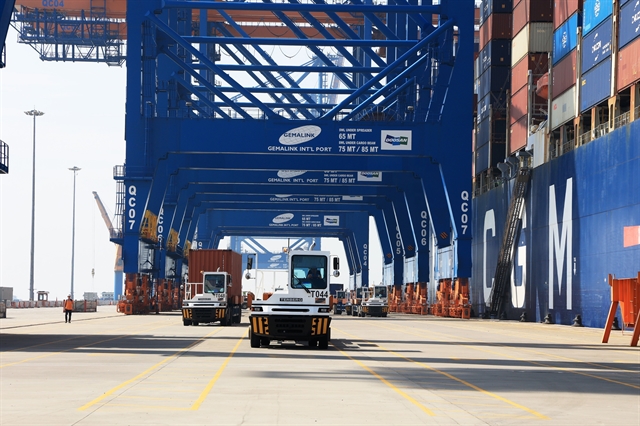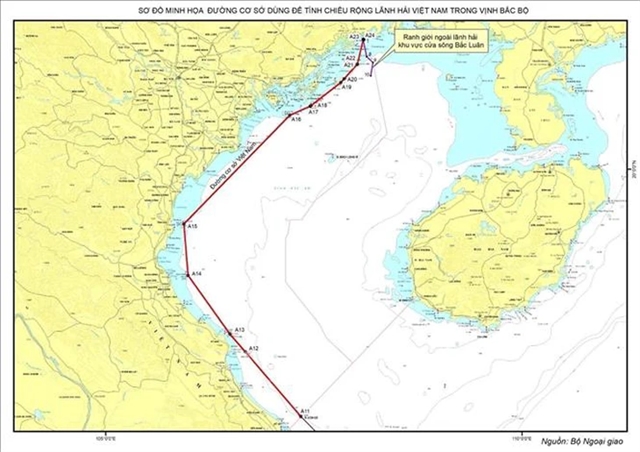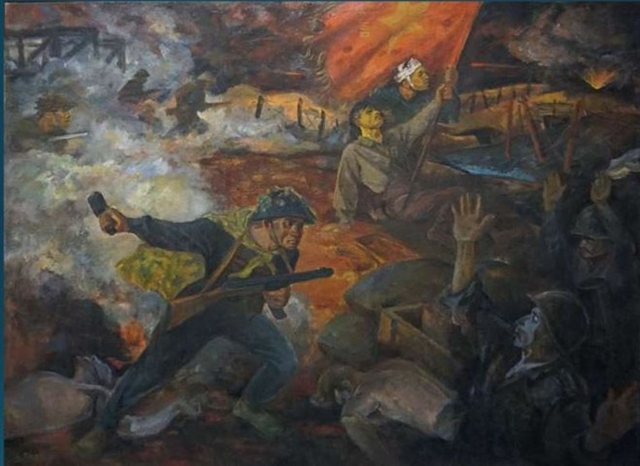 Life & Style
Life & Style

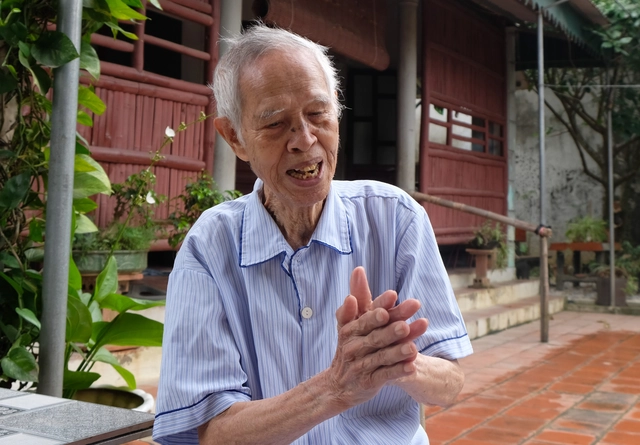 |
| Veteran Cao Xuân Thọ is hailed as "King of bomb disposal" during Điện Biên Phủ Campaign. Photo nld.com.vn |
Many Vietnamese soldiers, with unwavering determination, contributed to the Điện Biên Phủ Battle Victory that "resounded throughout five continents and shattered the world's colonialism" in 1954.
One is veteran Cao Xuân Thọ, who is hailed as one of the Vietnamese “Kings of bomb disposal” during the resistance war against the French.
With his remarkable contributions, Thọ had the honour of meeting President Hồ Chí Minh four times.
"People feel immense happiness and honour to meet President Hồ once, but I feel even more privileged as I had the opportunity to meet him four times. Those were the happiest moments in my life as a soldier," Thọ said.
The veteran, who is now nearly 100 years old, still remembers the brutal days spent alongside his comrades on the battlefield in Điện Biên Phủ.
Every road, position, and every shape of the bombs at the Cò Nòi T-junction, a place considered a fatal area in the Điện Biên Phủ battlefield, are imprinted in his mind.
In 1946, when Thọ was 19, he left his hometown of Thanh Hóa Province and joined the resistance army. Two years later, he willingly went to the battlefield as a soldier of the 308th Division of the Vietnam People's Army. He then served in military intelligence operating in the provinces Cao Bằng, Bắc Kạn and Lạng Sơn, and participated in the Autumn-Winter Campaign.
He also worked with the youth volunteer force operating in Hòa Bình, Upper Laos, and ultimately, Điện Biên Phủ campaigns.
"To prepare for the Điện Biên Phủ campaign, a youth volunteer force was formed under the code name Division X-P in 1953. At that time, the division established a team specialising in bomb disposal and road clearing. I was trusted to serve as the leader of the bomb disposal team in the 404th Company of the 40th Youth Volunteer Division," he told the Người Lao Động newspaper.
“Our team had the mission of bomb disposal and road clearance at the Cò Nòi T-junction. This was a crucial Three-way crossroads between National Highway 41, now National Highway 6, and National Highway 13, the main arteries leading to Điện Biên Phủ, hence considered a fatal zone that all soldiers had to overcome."
It was located in a narrow and deep valley, flanked by hills, making it a prime target for French air attacks. All logistical activities, including the reinforcement of forces and the transportation of weapons, supplies, and volunteer labourers from the northern province of Yên Bái and the delta of northern Việt Nam to Điện Biên Phủ had to pass through this junction.
It was a vulnerability that the French forces were aware of and they continuously concentrated firepower to destroy the only vital supply route to the battlefield.
"The Cò Nòi crossroads was always engulfed in bombs and shells. Every 10 minutes or so, enemy planes would swoop in to drop bombs and wreak havoc. There were days when they dropped 300 bombs of various types, weighing a total of 69 tons of explosives. I, together with two other comrades, was assigned the task of monitoring and pinpointing the exact locations where the time bombs were dropped. We would then plant warning flags and find ways to defuse the bombs," he said.
Despite the continuous bombardment by enemy aircraft, the soldiers in Bomb Disposal Team 404 rushed into the line of fire to plant warning flags and defuse bombs.
Bombs piled upon bombs, triggering one another in a chain reaction. The sky was filled with smoke and flames, Thọ said.
The mountains and forests were torn apart everywhere. Many soldiers fell, their bodies merging with the earth, rocks, and explosives. While in the midst of defusing a bomb, a nearby explosion buried Thọ under debris. Although he survived, he suffered three fractured vertebrae.
Despite constant dangers, Thọ and his comrades relentlessly patrolled the roads day and night with the determination to keep the "lifeline" of transportation. Thanks to their efforts, the route through the Cò Nòi junction remained open, allowing Vietnamese troops to advance steadily towards Điện Biên Phủ.
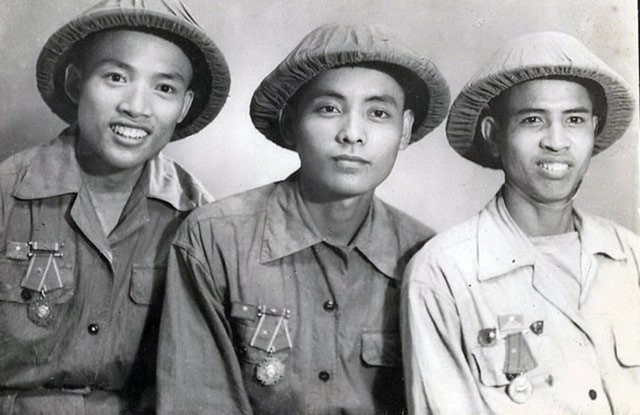 |
| Thọ (first right) is pictured with two comrades from his unit. Photo nld.com.vn |
Working under tonnes of bombs, there was a thin line between life and death. His comrades organised his "living funeral" four times before going on missions and he fortunately came back alive.
"For soldiers like us at that time, there was a deep-seated hatred towards the enemy. Death was regarded lightly, like a feather. So, after each mission was completed, feeling that we were still alive was considered very fortunate. Among those who were given a "living funeral" like me, there were those who went and never returned," Thọ said.
There were many memories that he could never forget in his military career. For example, there was a time when he had to immerse himself in freezing water while drinking fish sauce to defuse a bomb.
It was in March 1954 when their unit received information about a time bomb planted deep under a stream, around four metres away from the Tà Vài underwater road.
Higher command ordered Thọ's unit to remove the bomb before 6pm so that the military personnel and the artillery could safely pass through.
"At that moment, a comrade, Trần Văn Cam, dived down, but he had to resurface quickly because the water was too cold. Suddenly remembering the fishermen's experience, I drank four bowls of fish sauce to get warmed up and then dove down, discovering the bomb embedded in the rock wall at a depth of about four metres," he said.
"After locating the target, I returned to the bank and told my comrades to tie a rope around my waist before diving. We agreed that when I successfully attached the detonator to the fuse, I would give the signal to pull me back to the surface.
"After a 20-minute of disposing, a deafening blast echoed through the sky, and a towering column of water shot up tens of metres high. The Tà Vài Bridge was cleared, and the road was safe for traffic. Following that bomb disposal operation, our team was awarded the Order of Valour, and I had the honour of receiving the Third-class Military Service Order."
Throughout the Điện Biên Phủ Campaign, Major Cao Xuân Thọ, the leader of Bomb Disposal Team 404, successfully defused over 100 bombs of different types.
He was honoured three times with badges personally awarded by President Hồ Chí Minh. In particular, due to his significant contributions to the country, Thọ was bestowed with the title "Hero of the People's Armed Forces" in 2014.
Distinct honour
 |
| Thọ shows President Hồ Chí Minh's badges presented to him. Photo dantri.com.vn |
In the mind of "the King of bomb disposal", the memories of meeting with President Hồ remain indelibly imprinted.
He not only had the privilege of meeting the President four times, but also had the distinct honour of having the Third-class Military Service Order personally bestowed upon him by the President.
"The first time I met President Hồ was in December 1953. At that time, my comrades and I returned to the Việt Bắc Resistance Zone to attend the National Congress of Patriotic Soldiers. As soon as I entered the assembly hall, there was a sudden cheer. Subsequently, the entire hall fell silent to listen to President Hồ's speech, as he imparted words of guidance to the soldiers," he said.
Thọ met President Hồ another three times thanks to his unit’s remarkable achievements. The last time was during the National Congress of Heroic Soldiers in June 1956 at which he and his comrades were personally greeted and praised by the President.
He passes on his love for the homeland and country to the younger generation, becoming a mentor and role model for them.
"On every major national holiday, he is invited to schools to speak about history with teachers and students. He often tells his children, grandchildren, and the younger generation about the fierce nature of war and the courageous spirit of the Vietnamese military. This contributes to educating and instilling patriotism among the younger generation," said Đỗ Thị Thu, secretary of the Hoằng Giang Commune Youth Union. VNS

